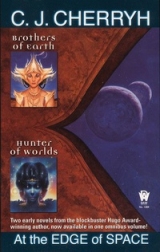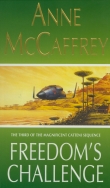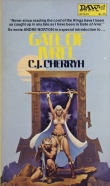
Текст книги "At the Edge of Space (Brothers of Worlds; Hunter of Worlds)"
Автор книги: C. J. Cherryh
Жанр:
Космическая фантастика
сообщить о нарушении
Текущая страница: 29 (всего у книги 36 страниц)
9
“My lord nas kame.”
Aiela came awake looking into the mottled gray face of an amaut, feeling the cold touch of broad fingertips on his face, and lurched backward with a shudder. There was the yielding surface of a bed under his back. He looked to one side and the other. Isande lay beside him. They were in a plaster-walled room with paned doors open on a balcony and the outside air.
He probed at Daniel’s mind and found the contact dark. Fear clawed at him. He attempted to rise, falling on the amaut’s arms and still fighting to find the floor with his feet.
“O sir,” the amaut pleaded with him, and resorted at last to the strength of his long arms to force him back again. Aiela struggled blindly until the gentle touch of Isande’s returning consciousness reminded him that he had another asuthe. She felt his panic, read his fear that Daniel was dead, and thrust a probe past him to the human.
Not dead,her incoherent consciousness judged. Let go, Aiela.
He obeyed, trusting her good sense, and blinked sanely up at the amaut.
“Are you all right now, my lord nas kame?”
“Yes,” Aiela said. Released, he sat on the edge of the bed holding his head in his hands. “What time is it?”
“Why, about nine of the clock,” said the amaut. That was near evening. The amaut used the iduve’s ten-hour system, and day began at dawn.
That surprised him. It ought to be dark in Weissmouth, which was far to the east of Daniel and Tejef’s ship. Aiela tried to calculate what should have happened, and uneasily asked the date.
“Why, the nineteenth of Dushaph, the hundred and twenty-first of our colony’s—”
Aiela’s explosive oath made the amaut gulp rapidly and blink his saucer eyes. A day lost, a precious day lost with Chimele’s insistence on sedation; and Daniel’s mind remained silent in daylight, when the world should be awake.
“And who are you?” Aiela demanded.
The amaut backed a pace and bowed several times in nervous politeness. “I, most honorable sir? I am Kleph son of Kesht son of Griyash son of Kleph son of Oushuph son of Melkuash of karshMelkuash of the colony of the third of Suphrush, earnestly at your service, sir.”
“Honored, Kleph son of Kesht,” Aiela murmured, trying to stand. He looked about the room of peeling plaster and worn furniture. Kleph in nervous attendance, hands ready should he fall. On Kleph’s shoulder was the insignia of high rank: Aiela found it at odds with the amaut’s manner, which was more appropriate to a backworld dockhand than a high colonial official. Part of the impression was conveyed by appearance, for Kleph was unhappily ugly even by amaut standards. Gray-green eyes stared up at him under a heavy brow ridge and the brow wrinkled into nothing beneath the dead-gray fringe of hair. Most amauts’ hair was straight and neat, cut bowl-fashion; Kleph’s flew out here and there in rebel tufts. The average amaut reached at least to the middle of Aiela’s chest. Kleph’s head came only scantly above Aiela’s waist, but his arms had the growth of a larger man’s and hung nearly past his knees. As for mottles, the most undesirable feature of amaut complexion, Kleph’s face was a patchwork of varishaded gray.
“May I help you, sir?”
“No.” Aiela shook off his hands and went out onto the balcony, Kleph hovering still at his elbow.
Weissmouth lay in ruins before them. Almost all the city had been reduced to burned-out shells, from just two streets beyond to the Weiss river, that rolled its green waters through the midst of the city to the salt waters of the landlocked sea. Only this sector preserved the human city as it had been, but there had never been beauty in the red clay brick and the squat square architecture, the concrete-and-glass buildings that crowded so closely on treeless streets. It had a sordid quaintness, alien in its concept, the sole city of an impoverished and failing world. Under amaut care the ravaged land might flourish again: they had skill with the most stubborn ground and their endurance in physical labor could irrigate the land and coax lush growth even upon rocky hillsides, hauling precious water by hand-powered machines as old as civilization in the zones of Kesuat, digging their settlements in under the earth with shovels and baskets where advanced machinery was economically ruinous, breeding until the settlement reached its limit and then launching forth new colonies until the world of Priamos could support no more. Then by instinct or by conscious design the birthrate would decline sharply, and those born in excess would be thrust offworld to find their own way. This was always the pattern.
But, Aiela remembered with a coldness at his belly, in less than two days neither human nor amautish skill would suffice to save the land: there would be only slag and cinders, and the green-flowing Weiss and the salt sea itself would have boiled into steam.
“What do you want here?” Aiela asked of Kleph. “Who sent you?”
Again a profusion of bows. “Lord nas kame, I am bnesychGerlach’s Master of Accounts. Also it is my great honor to serve the bnesychby communicating with the starlord in the port.”
“Khasif, you mean.”
Terror shone in the round face. Lips trembled. All at once Aiela realized himself as the object of that terror: found himself the stranger in the outside, and saw Kleph’s eyes flinch from his. “Lord—they use no names with us. Please. To the ship in the port of Weissmouth, if that is the one you mean.”
“And who assigned you here?”
“ BnesychGerlach, honorable lord. To guard your sleep.”
“Well, I give you permission to wait outside.”
Kleph looked up and blinked several times, then comprehended the order and bowed and bobbed his way to the door. It closed after, and Aiela imagined the fellow would be close by it outside.
The sun was fast declining to the horizon. Aiela leaned upon the railing with his eyes unfocused on the golding clouds, reaching again for Daniel—not dead, not dead, Isande assured him. So inevitably Daniel would wake and he would be wrenched across dimensionless space to empathy with the human, in whatever condition his body survived. His screening felt increasingly unreliable. Sweat broke out upon him. He perceived himself drawn toward Daniel’s private oblivion and fought back; the railing seemed insubstantial.
Isande perceived his trouble. She arose and hurried out to reach him. At her second step from the bed, mind-touch screamed panic. Her hurtling body fell through the door, her hands clutching for the rail. Aiela seized her, straining her stiff body to him. Her eyes stared upward into the sky, her mind hurtling up into the horrifying depth of heaven, a blue-gold chasm that yawned without limit.
He covered her eyes and hugged her face against him, dizzied by the vertigo she felt, the utter terror of sky above that alternately gaped into infinity and constricted into a weight she could not bear. Proud Isande, so capable in the world of Ashanome:to lift her head again and confront the sky was an act of bravery that sent her senses reeling.
Nine thousand years of voyaging—and world-sense was no longer in her. “It is one thing to have seen the sky through your eyes,” she said, “but I feel it, Aiela, I feel it. Oh, this is wretched. I think I am going to be sick.”
He helped her walk inside and sat with her on the bed, holding her until the chill passed from her limbs. She was not sick; pride would not let her be, and with native stubbornness she tore herself free and staggered toward the balcony to do battle with her weakness. He caught her before she could fall, held her with the same gentle force she had lent him so often at need. Her arms were about him and for a brief moment she picked up his steadiness and was content just to breathe.
The feeling of wrongness persisted. Her world had been perceptibly concave, revolving in perceptible cycles, millennium upon millennium. The great convexity of Priamos seemed terrifyingly stationary, defying reason and gravity at once, and science and her senses warred.
“How can I be of use,” she cried, “when all my mind can give yours is vertigo? O Aiela, Aiela, it happens to some of us, it happens—but oh, why me? Of all people, why me?”
“Hush.” He brought her again to the bed and let her down upon it, propping her with pillows. He sat beside her, her small waist under the bridge of his arm. In deep tenderness he touched her face and wiped her angry tears and let his hand trail to her shoulder, feeling again an old familiar longing for this woman, muted by circumstances and their own distress; but he would hurt with her pain and be glad of her comfort for a reason in which the chiabreswas only incidental.
My selfishness,he thought bitterly, my cursed selfishness in bringing you here;and he felt her mind open as it had never opened, reaching at him, terrified—she would not be put away, would not be forgotten while he chased after human phantoms, would not find him dying and unreachable again.
He sealed against her. It took great effort.
Daniel,she read in tearful fury, jealousy: Daniel, Daniel, his thoughts, he—
Human beings: human ethics, human foulness—the experience of an alien being who had known the worst of his own species and of the amaut, things she had known of, but that only he had owned: the attitudes, the habits, the feelingof being human. Asuthithekkhewith Daniel had been too long, too deep; with all the darknesses left, the secrets—to a devastating degree he washuman.
“Aiela,” she pleaded, put her arms about his neck and touched face to face, one side and the other. Humans showed tenderness for each other differently. Even at such a moment he had to be aware of it, and took her hands from him—too forcefully: he touched his fingers to her cheek, trembling.
A human might have cursed, or struck at something, even at her. Aiela removed himself to the foot of the bed and sat there with his back to her, his hands laced until his azure knuckles paled; and for several moments he strove to gather up the fragments of his kastien.To strike was unproductive. To hate was unproductive. To resent Daniel, perfect in his humanity, was disorderly; for Order had drawn firm lines between their species: it was the iduve that had muddled the two of them into one, and the iduve, following their own ethic, were highly orderly.
He felt Isande stir, and foreknew that her slim hand would reach for him; and she, that he would refuse it. It is notelethia to shut me out,she sent at him. No. You think you are going to leave me and do things your own way, but I will follow you, even if my mind is all I can send.
Stop it.He arose, shut out her thoughts, and went out to the balcony.
Ashanomeburned aloft like the earliest star of evening, a star of ill omen for Priamos, ineluctable destruction. A time ago he had been a ship’s captain in what now seemed the safety of the Esliph, a giyrehardly complicated. Now he was the emissary of the Orithain, holding things the amaut could in no wise know: a day lost, the night advancing, his asuthe crippled, a mission that he could not possibly fulfill. The next noon would see the deadline expire.
Suddenly he doubted Chimele had meant for him to succeed. He was no longer even sure her arastiethewould permit her to rescue a pair of lost kamethi before the world turned to cinders. If he defied her and ran through the streets crying the doom to come, it would save no one: the amaut could not evacuate in time. He must witness all of it. Bitterly he lamented that the idoikkheicould not send. He would beg, he would implore Chimele to take Isande home at least.
She will not desert us,Isande sent him. But doubt was in it. Chimele did not do things carelessly: it was not negligence that had set them, unconscious and helpless, among amaut. Motives with iduve were always difficult to reckon.
Aiela’s pulse quickened with anger that Isande tried to damp, frightened as she always was at defiance of the iduve. But there was one iduve ship at hand, one that would have to leave before the attack. At that remembrance, purpose crystallized in his mind; and Isande clung to the bedpost and radiated terror.
Send me to him? Blast you, no, Aiela! No!
Aiela shut out her objections, returned to the bedside and opened his case, donned a jacket against the cool of evening, and strapped on his service pistol. Isande’s rage washed at him, frustrated by his relief at having found help for her.
She sent memories: a younger Khasif seen through the eyes of a frightened kalliran girl, attentions that had gone far beyond what she had ever admitted to anyone—being touched, trapped in a small space with an iduve whose intentions were far more dangerous than katasukke.She made him feel these things: it embarrassed them both.
“Chimele forbade us to go to Khasif,” she said, foreknowing failure. He would have a vaikkato suffer for that: he reckoned that and hoped that he would even have the chance. His mind already drifted away from her, toward the dark of Daniel’s consciousness, toward the thing he had come to do.
He is HUMAN!The word shrieked through her thoughts with a naked ugliness from which even Isande recoiled in shame.
You see why I cannot touch you,Aiela said, and hated himself for that unnecessary honesty. She could not help it: something there was that set her inner defenses working when she found Daniel coming close to her, though she strove on the surface to be amiable with him. Male and alien,her reactions screamed, and in that order.
Did Khasif do that to you?Aiela wondered, not meaning her to catch it; perhaps it was too accurate—she threw up screens and would not yield them down. Her hands sought his, her mind inaccessible.
“How do you think you can help him?” she asked aloud.
“There are all the resources of Weissmouth. Out of the amaut and the human mercenary forces, there has to be some reasonable chance of finding a way to him.”
What she thought of those chances leaked through, dismal and doomsaying. Dutifully she tried to suppress it.
“Khasif favors me,” she said. “Greatly. He will listen to me. And I am going to seal myself somewhere I won’t compromise his security or Chimele’s, so that you can communicate with Ashanomethrough me—instantly, if you need to. Maybe Chimele will tolerate it—and maybe we’re lucky it’s Khasif: outside the harachiaof Chimele he can be a very stubborn and independent man; he may decide to help us.”
He might be stubborn about other matters: she feared that too, but she would risk that to influence him to Aiela’s help. Aiela caught that thought in dismay, almost dissuaded from his plans. But there was no other way for Isande, no other hope at all. He took her small valise from the bureau and helped her, arm about her waist, toward the door. Her faint hope that mobility would overcome the sensation of falling vanished at once: it was no better at all, and she dreaded above all to be in open spaces, with the sky yawning bottomless overhead.
Aiela expected Kleph outside. To his dismay there were three amaut, bowing and bobbing in courtesy: Kleph had acquired companions. He was surprised to see the gold disc of command on the collar of one, a tall amaut of middling years and considerable girth. That one bowed very deeply indeed.
“Lord and lady,” the amaut exclaimed. “ Sushai.”
“ Sushai-khruuss,” Aiela responded to the courtesy. “ BnesychGerlach?”
Again the bow, three-leveled. “Most honored, most honored am I indeed by your recognition, lord nas kame. I am Gerlach son of Kor son of Thagrish son of Tophash son of Kor son of Merkush fourteenth generation son of Gomek of karshGomek.” The bnesych,governor of the colony, was being brief. In due formality he might have named his ancestors in full. This was the confidence of an immensely important man, for anyone who had been in trade in the metrosiknew karshGomek of Shaphar in the Esliph. They were the largest and wealthiest of the karshatuof the colonial worlds. Gomek already controlled the economy of the Esliph, and their intrusion into human space had been no haphazard effort of a few starveling colonials. KarshGomek had the machinery and the support to make the venture pay, transporting indentured amaut vast distances at small cost to the company, great peril to the desperate travelers, and everlasting misery for the humans docile enough and tough enough to survive the life of laborers for the amaut. This place could be made a viable base of further explorations in search of richer prizes. Daniel’s kind were indeed in danger, if struggle with the iduve had weakened them or thrown them into disorder. As long as the human culture had within it the potential for another and another Priamos, with humans selling each other out, the amaut, who did not fight, could keep spreading.
“And this,” added the bnesych,bending a long-fingered hand at the young amaut female that stood at his elbow, “this is my aide Toshi.”
“Toshi daughter of Igrush son of Toshiph son of Shuuk of karshShuuk.” A person of middling stature, Toshi was as fair as Kleph was ugly—not by kalliran standards, surely, but palest gray. Her flat-chested figure was also flat-bellied and her carriage was graceful, but her pedigree was modest indeed, and Aiela surmised uncharitably what had recommended the young lady to the great bnesych.
Are you satisfied with your allies?Isande’s xenophobia pricked at him, she restless within the circle of his arm. In her vision they were pathetic little creatures, ineffectual little waifs of dubious morality.
Mind your manners,Aiela fired back. I need thebnesych’s good will.
Don’t trouble yourself. Kick an amaut and he will bow and thank you for the honor of your attention. You are nas kame. You do not ask in the outside world: you order.
“You may serve us,” said Aiela, ignoring her, “by providing us transportation to the port.”
“Ai, my lord,” murmured bnesychGerlach, “but the noi kame said you were to remain here. Are the accommodations perhaps not to your liking? They are humanish foul, yes, for which we must humbly beg your pardon, but you have been among us so short a time—we have gathered workmen who will repair and suit quarters to your most exacting order. Anything we may do for you, we should be most honored.”
“Your courtesy does you credit.” The kalliran phrase fell quite naturally from Aiela’s lips, irritating Isande. The arastietheof Ashanomehad been damaged; Chimele would have bristled had she heard it. “But you see,” Aiela continued over her objections, “I shall be staying. My companion will not. And I still require a means to go to the port, and I am in a hurry.”
BnesychGerlach opened and shut his mouth unhappily, rolled his lips in, and bowed. Then he began to give orders, hustled Toshi and Kleph off, while he clung close to Aiela and Isande, managing amazingly enough to scurry along with them and bow and talk at the same time, assuring them effusively of his cooperation, his wish to be properly remembered to the great lords, his delight at the honor of their presence under his roof, which he would memorialize with a stone of memory in his karshnest on Shaphar.
Isande, ill and dizzied, fretted miserably at his attendance, but bowing to Aiela’s wishes she did not bid the creature begone. When they descended in the antiquated cable lift, she lost all her combative urges and simply leaned against Aiela, cursing the nine thousand years of noi kame which had produced a being such as herself.
On ground level they found themselves in an immense foyer with glass doors opening onto a street busy with amaut pedestrians. A hovercraft obscured the view, dusting all and sundry, and settled to an awkward halt outside their building.
“Your car,” said the bnesychas Toshi and Kleph rejoined them. “Is it not, Toshi?”
“Indeed so,” said Toshi, bowing.
“Please escort our honorable visitors, Kleph.”
Now Kleph began the series of bows, curtailed as Aiela impatiently paid a nod of courtesy to the bnesych,to Toshi, and helped his ailing asuthe toward the door. Kleph hurried ahead to open the door for them, pried the valise from Aiela’s fingers, rushed ahead to the door of the hovercraft, and had the steps down for them in short order, scrambling in after they settled in the tight passenger space.
“To which ship?”
Aiela stared at him. “Which?”
“A second landed at noon today,” Kleph explained, moistening his lips. “I had thought perhaps it—in my presumption—forgive me, most honorable lord nas kame. To the original ship, then? Of course I did not mean to meddle, oh, most assuredly not, most honorable noi kame. I am not in the habit of prying.”
Ashakh must have returned,Isande sent, which worried her, for Ashakh was an unknown quantity in their plans.
“The original ship,” said Aiela, and Kleph extracted his handkerchief and mopped at his face. Occupying the cab of the hovercraft with two nervous amaut at close quarters, one could notice a slight petroleum scent. The cleanliness of Ashanomeand its filtered air rendered them unaccustomed to such things. The scents of amaut and wet earth, decaying matter, wet masonry, and the river—even Aiela noticed these things more than casually, and for Isande they were loathsome.
The little hovercraft proceeded on its way, a humming thunder kicking up sand in a cloud that often obscured their vision. It was getting on toward dark, that hour the amaut most loved for social occasions. Sun-hating, they stayed indoors and underground during the brightest hour and sought the pleasant coolness of the evening to stroll above-ground. Habishuwere opening, and from them would be coming the merry notes of gesheand rekeb;their tables were set out of doors, disturbed by the passage of the hovercraft. Irritated habishaapuwould be forced to wipe the tables again, and amaut on the streets turned their backs on the dust-raising hovercraft and shielded their faces. Such things were not designed for the streets, but then, streets and cities were a novelty to the amaut. It went against their ethic to spoil land surface with structures.
The hovercraft crossed the river in a cloud of spray and came up dripping on an earthen ramp, a bridge accessible but with some of its supports in doubtful condition. The fighting had badly damaged this sector. Hollow, jagged-rimmed shells reared ugliness against a heaven that had now gone dull. They followed a street marked with ropes and flags, at times riding one edge up and over rubble that spilled from shattered buildings.
The port was ahead, the base ship brightly lighted, rising huge and silver and beautiful among the amaut craft, a second ship, a sleek probe-transport, its smaller double. One thought of some monstrous nest, amaut vessels like gray, dry chrysalides, with the bright iduve craft shining among them like something new-hatched.
The hovercraft veered toward the larger, the original ship, but the amaut driver halted the vehicle well away from it. Human attendants came running to lower the hovercraft’s ramp, crowding about.
Isande misliked being set down among such creatures. She had accustomed herself to Daniel’s face; indeed there were times when she could forget how different it was. These were ugly, and they had an unwashed human stench. Even Aiela disliked the look of them, and helped Isande down himself, protecting her from their hands. He stepped to the concrete and looked at the two ships that shone before them under the floodlights, still a goodly walk distant. But Isande felt steadier: the dimming of the sun had brought out the first stars, and those familiar, friendly lights brought sanity to the horror of color that was the day sky.
I think I can walk,she said, and wistfully: if it were only a question of moving at night, I could probably—
No. No. You’re safer with him. Come, we’ll never get these amaut closer to those ships. Besides,arastiethe won’t permit Khasif to argue with us with them to witness it. If we want that ship to open to us, we had better be alone.
You are learning the iduve,Isande agreed. But he will take us inside before he asks why. Then—
The idoikkheiburned, jolted, whited out their minds. When Aiela knew that he was still alive and that Isande was, he found himself fallen partially on her, his head aching from an impact with the pavement, his right arm completely paralyzed to the shoulder. He touched Isande’s face with his left hand, cold and sick as he saw a line of blood between her lips; and this was the iduve’s doing, a punishment for their presumption. He hated. Ikasas it was to hate, he did so with a strength that made Isande cringe in terror.
“They will kill you,” she cried. And then the idoikkheibegan to pulse again.
It was different, not pain, but an irregular surge of energy that made one anticipate pain, and it had its own variety of torment.
Two minds,Aiela realized suddenly, remembering the sensation: two opposing minds,and his anger became bewilderment. Isande tried to rise with his help, found she could not, and then through her vision came a view of the other ship, hatch opening, a tall slim figure in black descending.
An iduve, onworld, among outsiders.
Even Tejef had maintained his privacy; that a nasulso exposed itself was unthinkable. Even in the midst of their private terror it occurred to the asuthi simultaneously that Priamos might die for seeing what it was seeing, an iduve among them. Had it happened on Kartos there would have been panic and mass suicides.
Mejakh!Isande recognized the person, and her thoughts became a babble of terror. The iduve was coming toward them. The idoikkheiwere beginning to cause pain as Mejakh’s nearness overcame Khasif’s interference.
Aiela hauled Isande to her feet and tried to run with her. The pain became too much. They stumbled again, trying to rise.
The hatch of the base ship opened and another iduve descended, careless of witnesses. Aiela forgot to struggle, transfixed by the sight. It was incredible how fast the iduve could move when they chose to run. Khasif crossed the intervening space and came to an abrupt halt still yards distant from Mejakh.
Sound exploded about them all, light: the ground heaved and a wall of air flung Aiela down, dust and cement chips showering about him as he tried to shield Isande. Choking black smoke confounded itself with the darkness: lights on the field had gone out. Amaut poured this way and that, gabbling alarm, human shapes among them. Powerful lights from off the field were sweeping the clouds of smoke, more obscuring than aiding.
Isande!he cried; but his effort to reach her mind plunged him into darkness and pitched him off balance: he felt her body loose, slack-limbed. His hand came away wet from hers, and he wiped the moisture on his jacket, sick with panic.
Hands seized him, hauled him up, attempted to restrain him: humans. He fired and dropped at least one, blind in the dark and smoke.
But when he was free again and sought Isande, he could not find her. Where she should have been there was no one, the pavement littered with stone and powder.
And close at hand an airship thundered upward, its twin lights glaring barefully through the roiling smoke.
Don’t let it go,Aiela implored the silent form of the base ship; but both his asuthi were dark and helpless, and the base ship made no effort to intervene. Weaponsfire laced the dark. More shadows, human-tall, raced toward him. Of the hovercraft there was no sign at all. It had deserted them.
A projectile kicked up the pavement near him. The chips stung his leg.
He ran, falling often, until the pounding in his skull and the pain in his side made him seek the shelter of the ruins and wait the strength to run again.








